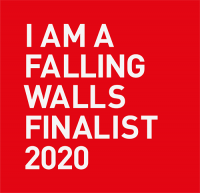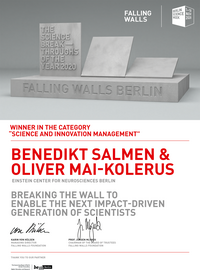Introduction

In the current education of early-career researchers, there is a gap between the problems of modern societies and the approaches which science is currently offering. Often, research questions cannot be answered by a single scientist or laboratory but require multiple workgroups who work together in an interdisciplinary way. Sometimes, even the collaboration with lay people is required. Traditional ways of educating graduate and under-graduate students do not offer training and methods needed for open research approaches.
Therefore, the ECN set-up a new way of educating PhD students in the neurosciences (see also our curriculum) putting great emphasis on PhD students learning how to do their science in open and collaborative ways and benefit from it, and also how to translate their science into innovation. As part of this program, PhD students engage in a 3-year Lab for Open Innovation in Science. In this lab, they learn about and experiment with open and collaborative ways of doing their research. They also develop their own Open Innovation in Science projects, which they submit to an Open Innovation in Science Award, enabling them to receive seed funding for new ways of implementing their Open Innovation in Science research projects.

This new way of teaching and training, which combines not only formal training of methods and concepts of Open Innovation in Science by local and international experts but also supports our PhD students when they integrate these concepts in their research projects, leads to an original and individual mix of practical training and hands-on application of the learned lessons. This also includes the involvement and (if wished for) training of the responsible principal investigator overseeing the PhD project. Furthermore, this approach to training also provides participants with the necessary network of local and international experts which is needed to succeed while starting to establish OIS relevant and suited research projects.
Our Lab for Open Innovation in Science module was awarded as a WINNER in the 'Science and Innovation Management' section of the Falling Walls Remote 2020 conference. You can visit our contribution here.



